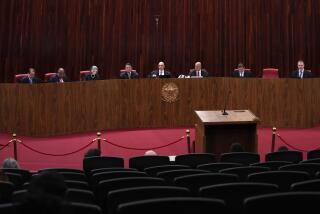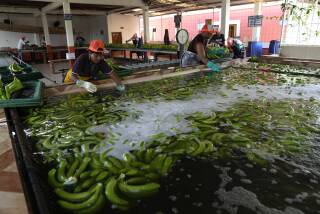Brazil’s Congress Urges Seizure of Drug-Growing Land
- Share via
RIO DE JANEIRO — The Brazilian government will have to expropriate any land used for the cultivation of marijuana or coca, under a tough anti-drug provision in Brazil’s new draft constitution.
By adopting the measure this week, the national Congress recognized the growing importance of Brazil in drug production. The country covers half of South America and has large areas suitable for growing marijuana and coca, from which cocaine is refined.
Harry W. Shlaudeman, the U.S. ambassador to Brazil, told a Brazilian Rotary Club meeting in June that this country, adjacent to the greatest sources of cocaine, cannot be immune to drug problems.
“Brazil itself is a producer, refiner, transit country and growing consumer of illegal narcotics, both coca and marijuana,” Shlaudeman said.
New Cultivation
Most cocaine is refined from coca leaf produced in neighboring Peru, Bolivia and Colombia. But cultivation of epadu, a variety of the coca plant, has spread in Brazil’s vast Amazon region during the past three years.
In the northwestern state of Amazonas, federal police reported destroying 5.3 million epadu bushes last July. Most of the plants, and several cocaine laboratories, were found in the so-called Dog’s Head, a jungle area delineated by the Colombian border in an irregular design that suggests a canine’s muzzle and ears.
The impoverished northeast region of Brazil, meanwhile, is already one of the world’s leading producers of marijuana, where thousands of peasant families depend on marijuana farming for a livelihood. Last year police reported destroying more than 113 million marijuana plants in the region.
Produced mainly in the states of Pernambuco and Bahia, Brazilian marijuana is marketed in Brazil and some other countries of Latin America and Europe. The constitutional provision adopted this week says that any parcels of land on which “psychotropic plants” are found growing “will immediately be expropriated and specifically destined to the settlement of farmers for the cultivation of food and medical products, without any compensation to the property owner and without prejudice to other sanctions foreseen in the law.”
Confiscation Sanctioned
It also says that goods acquired with illicit drug profits will be confiscated and turned over to institutions and persons specialized in the treatment and rehabilitation of addicts.
With a population of 140 million, Brazil is a major market for marijuana, and Brazilian consumption of cocaine has multiplied over the past few years. So far, the country’s main role in the international drug market is as a transit area for cocaine coming from Peru and Bolivia and going to the United States and Europe.
Increasing amounts of cocaine undergo refining in clandestine Brazilian laboratories. Last December in the state of Mato Grosso, federal police raided what they said was the biggest cocaine lab ever discovered in South America, with a production capacity of more than 100 pounds a day.
In two big June raids, federal police confiscated 330 pounds of cocaine in the state of Rio de Janeiro and 175 pounds in Mato Grosso Sul. At least some of the drug, which apparently came from Bolivia, was to be distributed in Rio, police said.
More to Read
Sign up for Essential California
The most important California stories and recommendations in your inbox every morning.
You may occasionally receive promotional content from the Los Angeles Times.









